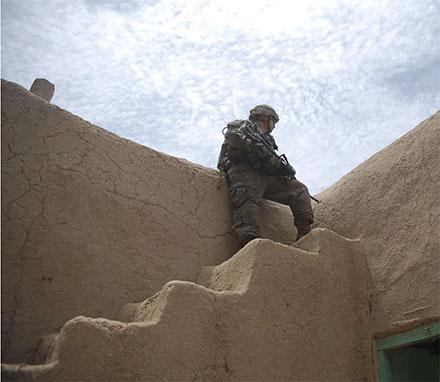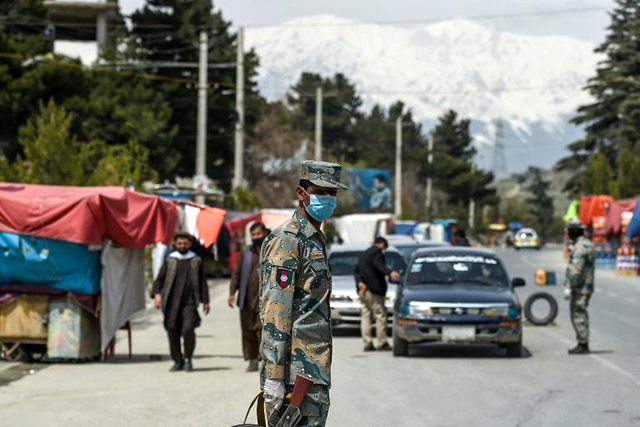You are here
Abandoned by Trump, can Afghans pin their hopes on Biden?
By AFP - Nov 20,2020 - Last updated at Nov 20,2020

In this file photo taken on August 3, 2010, a US soldier takes position at a house with Charlie Company 2-508 PIR 2nd Platoon and members of the 2nd BTC, 101st Airborne Division and the Afghan national army in Arghandab Valley, in Kandahar Province (AFP photo)
KABUL — Donald Trump's plan to slash US troops in Afghanistan could unleash a fresh wave of violence by an emboldened Taliban, analysts say, but a more measured approach by Joe Biden could take the sting out of the insurgent group's bid for power.
The latest move would see another 2,000 US troops exit Afghanistan by January 15 — less than a week before Biden is due to be sworn into office — leaving just 2,500 behind.
The Pentagon announced the plans on Tuesday, after Trump pledged to end a war that has killed about 2,400 American service members and cost over a trillion dollars.
“The hope is that the US [under Biden] would not rush to the exit, would apply more coercive pressure on the Taliban,” said Nishank Motwani, deputy director at the Afghanistan Research and Evaluation Unit (AREU).
“The emphasis on withdrawal does not help President Ashraf Ghani much — or Afghan forces — because the Taliban know they can wait out the US and push for total power,” he told AFP.
Still, drawing down troop levels to 2,500 by January is something the incoming Biden administration might already be comfortable with, said Vanda Felbab-Brown of the Brookings Institution.
“If the US wants to stay a few months, the Taliban can swallow that,” she told AFP, but difficulties would emerge if he plans to keep the force beyond May 2021.
The US being around for another five years or more “is not palatable to the group”, she added.
‘Irresponsible’
Any drawdown — either by Trump or continued by Biden — will have a considerable impact on the battlefield, according to Afghan political analyst Atta Noori.
“This is very irresponsible because the war on terrorism has not ended in Afghanistan yet,” he said.
Ideally, Washington would maintain a small but capable residual force and intelligence assets, said the AREU’s Motwani.
Violence has surged in recent months despite the Taliban and Afghan government engaging in peace talks in Qatar since September 12.
Despite the negotiations, the Taliban have launched offensives targeting Afghan forces across the country, and officials also blame them for two brutal attacks on education centres in Kabul that killed dozens of students in recent weeks.
But it is not just the bloodshed that worries Afghan officials.
The drawdown has also hardened the Taliban position at the negotiating table in Doha where peace talks have remained deadlocked for weeks.
“The Taliban know the Americans are leaving, and leaving behind a besieged and weak ally that has limited political and military options,” Motwani said.
No compromise
A government negotiator involved in the talks agreed.
“Trump’s push for a quicker withdrawal of troops has created a sense among the negotiators — especially the Taliban side — that the world is abandoning Afghanistan,” he said, asking not to be identified.
“That could be one main reason we have not seen any compromise from the Taliban.”
The insurgents agreed to kickstart peace talks after signing a deal with Washington in February that paved the way for withdrawing all foreign forces by May 2021.
In return, the Taliban promised not to attack US forces and said they would also stop transnational jihadist groups such as Al Qaeda and the Daesh from operating in the country.
While the Afghan government may have pinned their hopes on Biden, the Taliban clearly want Trump’s pledge to be completed.
Reacting to Biden’s election victory, early this month, the group said the current agreement remained the “most reasonable and effective tool” for ending the conflict.
Related Articles
DOHA — US Secretary of State Mike Pompeo met negotiators from the Afghan government and the Taliban in Doha on Saturday, amid signs of progr
KABUL — Two months after the US and the Taliban signed a deal Washington heralded as the way to end Afghanistan's war, violence is spirallin
TEHRAN — The Taliban said on Monday in Tehran that it will continue its "fight" if foreign troops do not withdraw from Afghanistan by May 20

















